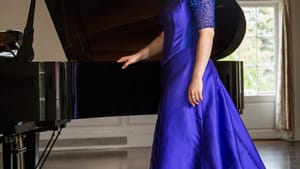Stay in the Loop
BSR publishes on a weekly schedule, with an email newsletter every Wednesday and Thursday morning. There’s no paywall, and subscribing is always free.
Love takes many forms
Philadelphia Chamber Music Society presents Erin Morley’s ‘Love Songs’

American soprano Erin Morley became the first artist to christen the new performance space at the Pennsylvania Academy of the Fine Arts (PAFA) with a complete vocal recital, presented under the auspices of the Philadelphia Chamber Music Society. Before I turn to her complex and intriguing program, unassumingly titled Love Songs, let me say a few words about the hall.
A satisfying venue—especially up front
The single-level, 250-seat Rhoden Arts Center auditorium certainly fills a need for smaller dedicated music venues in Philadelphia, and its central location on the North Broad Street corridor makes it easily accessible by a variety of public transportation options. It’s also appealing to be able to hear world-class musical artists and then, within a matter of minutes, stroll upstairs and consider a plethora of visual treasures. In terms of a satisfying experience, the place has much in its favor.
To my ears, the acoustics favored Ken Noda’s piano over Morley’s lean, crystalline soprano, though she was never anything less than perfectly audible. In the future, I could imagine this becoming a premier hall for piano recitals, in terms of both intimacy and sound. The woman seated next to me described the dynamics as dry, but I don’t share that view—I found the crispness pleasing, and I imagine balances will shift as the hall continues to be tuned and used in the future.
Sightlines cause the space’s greatest concern. Understandably, the hall had to be designed with PAFA’s structural realities in mind, but the subterranean venue features a surprising amount of potential obstructions for a hall so small. The essentially ground-level stage, combined with a continental seating design that employs only a slight rake, leaves a large segment of the audience to consider the performer only from the torso up. Especially in the case of a vocal recital, I recommend sitting close to the stage to appreciate the full experience.
Short but ambitious
Other than that, Mr. Kelsall, how was the performance? Certainly ambitious: Morley—a Metropolitan Opera mainstay known primarily for soubrette roles in the operas of Strauss and Offenbach—sang in six different languages across the program’s lean 90 minutes. Her German and Spanish diction particularly sparkled, though she showed the greatest connection to text in her native tongue.
Morley grouped together songs that represented different kinds of love, including the romantic, motherly, and spiritual varieties. She also considered unrequited desires and the nature of grief. She sang with beauty of tone throughout the afternoon, although she occasionally overused vibrato in a manner that obscured pitch and led to sloppy trills. It stands to reason that her voice may be in a transitional phase, one that hasn’t yet reached its ultimate conclusion.

Parenthood, faith, and a high A-flat
A mother to three young children, Morley clearly felt a connection to the music of parenthood, which of course featured Dvořák’s ravishing “Songs My Mother Taught Me” from Ciganske melodie. She sang the familiar tune with surprisingly lusty chest tones, and I appreciated her learning the Czech text rather than the comparatively easier German translation that some artists occasionally still employ. She was equally lovely in Rachmaninov’s “Margaritki” (“Daisies”), comparing the beautiful and delicate flowers to her children.
Rachmaninov’s “Son” (Dreams) figured into her section on religious devotion—a relatively new addition to the program, it showed a tentativeness not in evidence elsewhere, though she admirably never relied on a music stand. Morley seemed more at home in Ralph B. Woodward’s setting of the Blake poem “Little Lamb,” and in the fluttery “Praises of God” from Samuel Barber’s Hermit Songs.
Artists who make their career in opera sometimes struggle in the recital format, favoring sound over words when singing lieder. Morley was not immune to this, particularly in selections by Strauss and Poulenc. She also tended to overexplain the thought patterns underpinning her song selections when the music often spoke perfectly well for itself.
Still, she provided a mostly enjoyable afternoon and a welcome chance to experience PAFA’s new space. And with her encore—“Les oiseaux dans la charmille,” from Les contes d’Hoffmann—she gave the audience exactly what it wanted, right up to a high A-flat. The crowd floated out into the midday sun—that is, those who didn’t stick around the gallery to commune further with art.
What, When, Where
Love Songs. Erin Morley, soprano. Ken Noda, piano. Philadelphia Chamber Music Society. March 31, 2019, at the Pennsylvania Academy of the Fine Arts, 118-128 N. Broad Street, Philadelphia. (215) 569-8080 or pcmsconcerts.org.
PAFA is an ADA-compliant venue. Wheelchairs are available free of charge to patrons who need them. PCMS performs in a variety of venues around the city. Patrons with specific questions about accessibility can call (215) 569-8080 or email [email protected].
Sign up for our newsletter
All of the week's new articles, all in one place. Sign up for the free weekly BSR newsletters, and don't miss a conversation.
 Cameron Kelsall
Cameron Kelsall